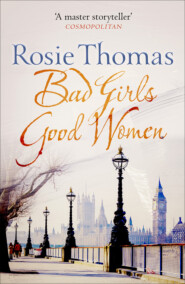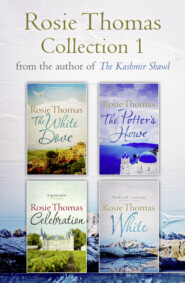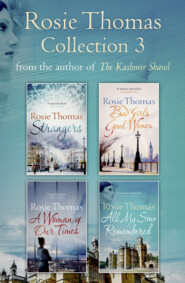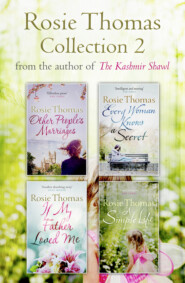По всем вопросам обращайтесь на: info@litportal.ru
(©) 2003-2025.
✖
Rosie Thomas 3-Book Collection: Moon Island, Sunrise, Follies
Автор
Год написания книги
2019
Настройки чтения
Размер шрифта
Высота строк
Поля
She had blocked off the channels already and had no idea how to clear them. They both sat still, locked by the failure of communication.
‘Just feeling blue?’
‘I guess.’
At least he was holding her. But as soon as the thought came she was uncomfortable with the weight of his arms, the thump of his heartbeat against her ear. Her flesh shivered. The physical solidity of him was an invasion.
There was a tap on the door-frame. Leonie was standing there wearing a plaid shirt and hiking boots. She said uncertainly, ‘I was wondering about that walk. But we can easily do it another day.’
John lifted his hand an inch from May’s head and as soon as he did so May leapt to her feet and backed away, hump-shouldered and frowning.
‘May, how about coming with us?’ John asked.
‘No, thanks.’
They made an attempt to persuade her, then John went to put on his boots and Leonie tried to talk to May. May managed to answer every question with a monosyllable, but this victory gave her no satisfaction. At length John and Leonie went out together and May was left to drift out on to the porch, to watch their figures disappear northwards across the headland.
Ivy came up through the garden from the beach. ‘Hi. What is there to eat?’
‘How should I know?’
Ivy ignored her and busied herself with hauling food out of the refrigerator. ‘I’m starved. D’you want something?’
May could see that Ivy was wearing her marijuana face. Her eyes were pink and heavy-lidded, and she had a stupid, muzzy smile. She had been smoking with Lucas; it made her obliging and affectionate instead of the way she usually was. And it made her hungry, too.
Why did John never notice what was so plain? May felt angrier still with his lack of perception. ‘What have you been doing?’ she asked her sister sharply.
Ivy’s shapeless smile widened. ‘None of your business, kid.’
‘You’ve been smoking weed.’
Ivy turned her silky, sun-tanned back. ‘Grow up,’ she drawled.
The coastline above Pittsharbor and Moon Island Beach became a ragged fringe of wooded promontories and narrow green inlets lined with sloping ledges of granite. By staying close to the tideline it was possible to walk or scramble the two miles to a rocky causeway linking Berry Island to the mainland.
Leonie knew the route well and most of the owners of the summer cottages that stood back from the water in their secluded clearings. She liked walking and often came this way alone, but John turned out to be a good companion. He didn’t press too close on her heels where the path was narrow and on the strips of shingle beach he moved unobtrusively alongside her. He seemed content not to talk very much. They found a rhythm of step and breath, and stuck to it.
The causeway itself was a narrow spine of rocks from which the tide dropped to expose shoulders of sand and stone. It was low water when they crossed over, and they walked easily between lacings of driftwood and sea wrack and the occasional battered reminder of a lobster float. The soft, still afternoon had faded into an early evening the colour of smoke and the only sound apart from the chafing of the sea was the regular spoon-in-sugar crunch of their boots on the shingle.
Berry Island hung at the end of the rock chain like the dot of an exclamation point. There were no trees on it, only a scrub of blueberry and wild raspberry bushes, rocks and rough marsh grass, and the occasional painterly splash of a turks-cap lily. A path led over its mild convex hump to a tiny shelf of sand uncovered by the receding tide.
When they came to this ghost of a beach they sat down by unspoken agreement on the sand, from where they could look back at Moon Island and the needle spire of Pittsharbor Unitarian Church beyond. Leonie held out her hand and revealed a little heap of raspberries glimmering in their own juice. They took and ate one each, in turn, until they were all gone. The eastern horizon slowly turned the colour of pewter, ready to draw up the darkness.
‘They’re biting,’ Leonie said, pinching a mosquito off her wrist. ‘No-see-’ums, the Indians called them.’ She took a bottle of insect repellent out of her pocket and anointed her face and hands with it before passing it to John. He tipped it and went through the same motions, his gestures exactly mirroring hers. When he handed back the little bottle their fingers touched.
Leonie held herself still. There was a tranquillity about the place and the evening that was at the opposite end of the scale from the way she had felt in the town car-park. She feared the betrayal of some inappropriate gesture or movement, from herself as much as from John.
He was sitting with his knees drawn up, one hand clasped on the other wrist, gazing across to the bay. It’s like I’m setting both of us a test, she thought. Dare to come to my good place and see if we don’t spoil it.
She had been disconcerted by John’s casual suggestion to May that she might come along too. But now it came to her that it might have been a good idea. Dreamily, lulled by the repetition of the waves, she imagined how May might even have liked it. They might have talked quietly, about ordinary things. ‘It can’t be easy for you,’ she said, speaking her thoughts without preamble. John did not seem surprised, as if they had all the time been thinking in parallel.
‘No. It isn’t easy,’ he agreed. ‘For Ivy and May, or for me.’
‘What happened to your wife?’
‘It was a cerebral haemorrhage. She was dead within minutes. She was at a friend’s apartment, I wasn’t there. She had had a headache, that was all.’
Leonie stared ahead of her at the gulls strutting on a rib of rock that jutted out of the sea. When the space grew too crowded one of them would lift away and slide through the air to another vantage point.
She was imagining the impact of this sudden death. The magnitude of it and the details that must have gone with it. Telephone calls, news to be broken, a funeral, children to be guarded. In an unregarded hollow within herself she felt sympathy expanding, the pressure of it tightening against her chest wall. ‘I’m sorry,’ she said, a sudden breathlessness making her inarticulate.
John ducked his head. ‘She didn’t deserve it.’
Leonie wondered why he should use those words.
He went on, looking out to Moon Island and the houses of Pittsharbor, ‘Al was a vivid person. She lived at double the pace of everyone else, at twice the intensity. If she disapproved of something she fought it, if she loved something she would defend it to the end, right or wrong.’
A picture began to form in Leonie’s head. A woman, not just a shadow of a dead wife and mother. Her fleshed-out presence lent different nuances to the way John sat here on the beach, how their arms didn’t touch, and they both gazed ahead at the birds and the darkening horizon instead of looking at each other. ‘How did Ivy and May deal with losing her?’
‘Differently. Ivy grew up too quickly. May was sometimes angry, sometimes withdrawn. You’ve seen something of how she can be.’
‘Yes,’ Leonie said. Truthfully, she did not think John’s daughters seemed much different from any of the other children she knew of their age. But she understood nothing about being a parent. It would be presumptuous, she thought, to offer an opinion.
‘Sometimes I catch myself saying to her, Alison, I’m sorry. I’ve screwed up with our children. Then I’m surprised at having said her name way inside myself. I guess the truth is I don’t miss her that much, not any more. I did, but she’s so conclusively gone.’
‘I think I understand that,’ Leonie said. To be gone didn’t necessarily mean death. There were other withdrawals and disconnections that were no less final.
‘And other times I think that the two of them might still have grown into the angry, pained women they seem to be now, even if their mother had been around.’
‘Perhaps. Or perhaps their anger and pain just seem more pronounced to you, because they allow you to see it. Even expect you to deal with it for them. Which means they have faith in you.’
‘I don’t know.’ The words broke out of him. ‘I don’t know anything. I thought I did, when they were younger. Then, after Alison died everything seemed to break up and get washed away. I shouldn’t have brought them here this summer. Neither of them really wanted to come and I thought it would be good for us all.’
‘You don’t know for sure that it isn’t. And it is only a vacation.’
Leonie heard rather than saw that he was suddenly smiling. ‘You could be right. And if we hadn’t come, you and I wouldn’t have met.’
She considered this. The acknowledgement that their meeting was significant was important to her, but all the time she was aware of taking steps that she couldn’t retrace. Nor do I want to retrace any steps, she thought. I don’t want to go backwards, to anywhere I already know.
She nodded her head and let her chin rest on her knees. The day’s heat was beginning to drain out of the air. They sat in silence for a while, listening to the sea fretting at the shingle, comfortable with the beach and the sky, and with one another’s company. They had come to the good place and nothing had happened to discolour it.
In the end it was only the thought of the rocky causeway and the rising tide that made them turn back again. Leonie led the way across the top of the island, familiar with the twists of the path even in the fading light. When they reached the last headland and the secluded crescent of Moon Island Beach they stood for a moment to look at the five houses. Their roofs and gables were black and strong against the navy-blue sky.
Neither John nor Leonie said anything more before they reached the Captain’s House and bade one another good-night, but she knew they had come an extra distance together. As she went up the steps to the Beams’ house she felt happy and calm, as she had not done for a long time.
Six (#uc4e8d550-0b6a-5851-a3e0-a45aae09958f)
Elizabeth laid a tray with a lace cloth and three bone china cups and saucers, and set a silver cream jug beside them with a beaded net over the rim. She was folding napkins, in case her guests chose to eat fragile lemon cookies, when she heard the knock at the door.











